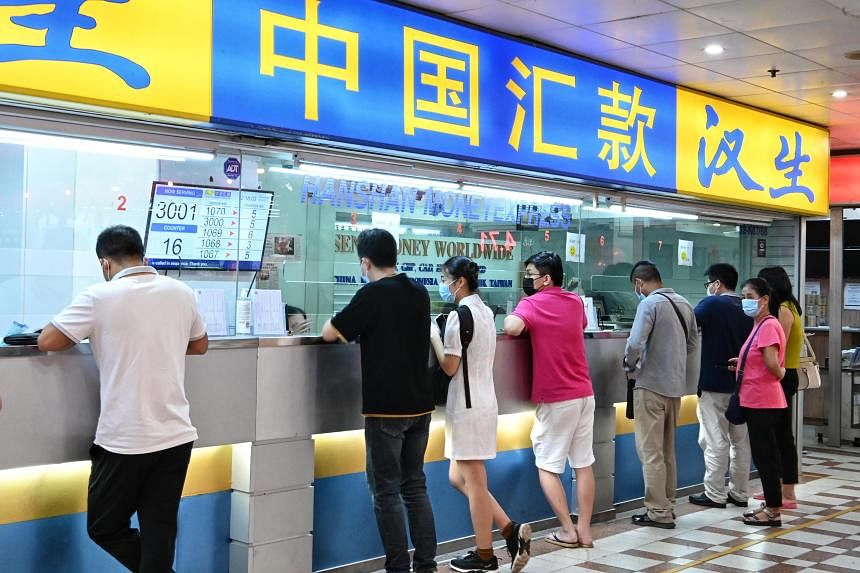SINGAPORE – Money remittance providers, including those offering cross-border online payments and unlicensed services, pose the highest risk of being targeted for terrorism financing.
This is according to an updated Terrorism Financing National Risk Assessment (TFNRA) report published on July 1 by the Finance and Home Affairs ministries and the Monetary Authority of Singapore (MAS).
In the report, which was last published in 2020, the agencies also identified new cross-border fast payment systems and online fund-raising as emerging risk areas.
Cross-border fast payment systems include services provided through bank apps and QR codes.
The agencies said these have emerged on the radar because of Singapore’s high internet penetration, the prevalence of online banking, and the global surge in the digital economy driven by the Covid-19 pandemic.
The agencies said money remittances are popular among Singapore’s foreign migrant worker population, who find that the providers offer them “cost-effective and efficient remittance services compared with banks”.
However, the agencies noted that some of the countries in the region that local remittance agents frequently transact with are known to have higher exposure to terrorism and terrorism financing risks.
In 2020, a 36-year-old Singaporean man was convicted of a terrorism financing offence for sending $450 to a man in Turkey linked to militant group ISIS through remittance company Western Union.
He was sentenced to two years and nine months’ jail.
The report also flagged concerns about foreign online fund-raising campaigns.
A 27-year-old Bangladeshi construction worker was sentenced in 2022 to two years and eight months’ jail after he donated nearly $900 through various online platforms to Syrian-based terrorist organisations in 2020.
He was convicted of five charges related to terrorism financing.
“The Singapore authorities have observed that donations to foreign online fund-raising campaigns typically traverse traditional payment channels, including payment service providers, bank transfers, or digital banking platforms such as credit and debit cards,” said the agencies.
They added that MAS and the Ministry of Home Affairs have intensified efforts to raise awareness among the payment and banking sectors of the terrorism financing risks associated with donations to foreign online fund-raising campaigns.
“These efforts involve engagement sessions where red flag indicators and suspicious entities are shared, sensitising the sectors to the potential risk of terrorism financing abuse through Singapore’s banking and payment systems by foreign online fund-raising platforms,” said the agencies.
The report also identified industries of concern, including precious stone and precious metal dealers, and digital payment token (DPT) service providers.
“Notably, DPTs have been used as a channel to support terrorist activities by sending DPTs to individuals or groups linked to terrorist organisations in conflict zones, or cryptocurrency exchange platforms with links to terrorism financing in the Middle East,” the agencies said.
The TFNRA report was published with the national strategy for countering the financing of terrorism.
Aside from identifying risk areas, the national blueprint looks at tackling the threat by enhancing legal frameworks and regulatory regimes as well as law enforcement actions, and through international partnerships and cooperation.
Key legislation includes the Terrorism (Suppression of Financing) Act 2002 (TSOFA) and the Internal Security Act 1960.
“Specifically, we have strengthened TSOFA over the years to criminalise terrorism financing activities and raised the maximum penalty for terrorism financing offences,” the agencies said.
Since the enhancements to the terrorism financing regime in 2018, seven individuals have been convicted of offences under the Act, with sentencing terms ranging from 18 months to 46 months.
The agencies noted that remittance service agents in Singapore have implemented more stringent controls to detect red flags, including using advanced data analytics to monitor transactions.
However, they acknowledged that smaller-scale agents may lack the resources to employ advanced tools, relying instead on conventional know-your-customer and screening measures.
As for tackling the unlicensed money remittance sector in Singapore, the agencies said the authorities will conduct outreach and education programmes with community partners and migrant worker dormitories to highlight the importance of using licensed remittance agents.
More licensed agents will also be located nearer to dormitories, while alternatives such as licensed digital payment services will be made available, the agencies said.
The report found that while banks in Singapore have not been exploited for terrorism financing activities to date, a small amount of funds linked to people of interest could have been initially deposited with the banks.
“Singapore is also mindful of the risk of radicalised individuals using our banking system to provide funds for terrorism-related activities abroad, particularly due to the typically small amounts involved and the difficulty in distinguishing those amounts from legitimate transactions,” said the agencies.
To mitigate the risks, MAS and law enforcement agencies will hold regular dialogues with the banks.
This will help banks to be familiar and up to date with the latest terrorism financing trends, and encourage them to update their risk mitigation measures.
Since 2016, Singapore has convicted 13 individuals of terrorism financing offences. Most of the individuals were supporters of ISIS.
The TFNRA report found that those who gave money to terrorism causes predominantly used licensed remittance agents, without complex or suspicious transaction patterns.

